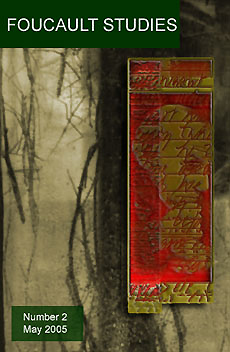Impossible Dialogue on Bio-power: Agamben and Foucault
DOI:
https://doi.org/10.22439/fs.v0i2.856Abstract
In Homo Sacer, Giorgio Agamben criticizes Michel Foucault's distinction between 'productive' bio-power and 'deductive' sovereign power, emphasizing that it is not possible to distinguish between these two. In his view, the production of what he calls 'bare life' is the original, although concealed, activity of sovereign power. In this article, Agamben's conclusions are called into question. (1) The notion of 'bare life', distinguished from the 'form of life', belongs exclusively to the order of sovereignty, being incompatible with the modern bio-political notion of life, that is univocal and immanent to itself. In the era of bio-politics, life is already a bios that is only its own zoe ('form-of-life'). (2) Violence is not hidden in the foundation of bio-politics; the 'hidden' foundation of bio-politics is love (agape) and care (cura), 'care for individual life'. (3) Bio-politics is not absolutised in the Third Reich; the only thing that the Third Reich absolutises is the sovereignty of power (Aryan race) and the nakedness of life (the Jews). (4) St Paul's 'messianic revolution' does not endow us with the means of breaking away from the closure of bio-political rationality; on the contrary, Paul's 'messianic revolution' is a historical precondition for the deployment of modern bio-politics. (5) Instead of homo sacer, who is permitted to kill without committing homicide, the paradigmatic figure of the bio-political society can be seen, for example, in the middle-class Swedish social-democrat.Downloads
Published
2005-05-01
How to Cite
Ojakangas, M. (2005). Impossible Dialogue on Bio-power: Agamben and Foucault. Foucault Studies, (2), 5–28. https://doi.org/10.22439/fs.v0i2.856
Issue
Section
Exchanges
License
Authors retain copyright to their work, but assign the right of the first publication to Foucault Studies. The work is subject to a CC BY-NC-ND 4.0 license, but despite these restrictions, authors can take for granted that Foucault Studies will permit articles published in Foucault Studies to be translated or reprinted in another format such as a book providing a full reference is made to Foucault Studies as the original place of publication.



